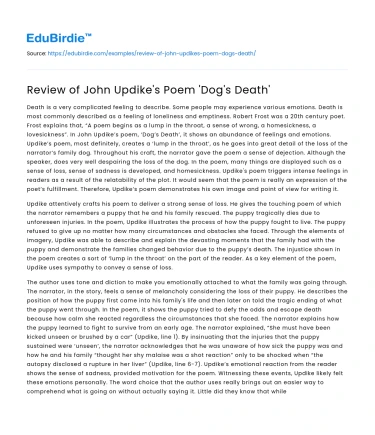Death is a very complicated feeling to describe. Some people may experience various emotions. Death is most commonly described as a feeling of loneliness and emptiness. Robert Frost was a 20th century poet. Frost explains that, “A poem begins as a lump in the throat, a sense of wrong, a homesickness, a lovesickness”. In John Updike’s poem, ‘Dog’s Death’, it shows an abundance of feelings and emotions. Updike’s poem, most definitely, creates a ‘lump in the throat’, as he goes into great detail of the loss of the narrator’s family dog. Throughout his craft, the narrator gave the poem a sense of dejection. Although the speaker, does very well despairing the loss of the dog. In the poem, many things are displayed such as a sense of loss, sense of sadness is developed, and homesickness. Updike's poem triggers intense feelings in readers as a result of the relatability of the plot. It would seem that the poem is really an expression of the poet’s fulfillment. Therefore, Updike’s poem demonstrates his own image and point of view for writing it.
Updike attentively crafts his poem to deliver a strong sense of loss. He gives the touching poem of which the narrator remembers a puppy that he and his family rescued. The puppy tragically dies due to unforeseen injuries. In the poem, Updike illustrates the process of how the puppy fought to live. The puppy refused to give up no matter how many circumstances and obstacles she faced. Through the elements of imagery, Updike was able to describe and explain the devasting moments that the family had with the puppy and demonstrate the families changed behavior due to the puppy’s death. The injustice shown in the poem creates a sort of ‘lump in the throat’ on the part of the reader. As a key element of the poem, Updike uses sympathy to convey a sense of loss.
Save your time!
We can take care of your essay
- Proper editing and formatting
- Free revision, title page, and bibliography
- Flexible prices and money-back guarantee
The author uses tone and diction to make you emotionally attached to what the family was going through. The narrator, in the story, feels a sense of melancholy considering the loss of their puppy. He describes the position of how the puppy first came into his family's life and then later on told the tragic ending of what the puppy went through. In the poem, it shows the puppy tried to defy the odds and escape death because how calm she reacted regardless the circumstances that she faced. The narrator explains how the puppy learned to fight to survive from an early age. The narrator explained, “She must have been kicked unseen or brushed by a car” (Updike, line 1). By insinuating that the injuries that the puppy sustained were ‘unseen’, the narrator acknowledges that he was unaware of how sick the puppy was and how he and his family “thought her shy malaise was a shot reaction” only to be shocked when “the autopsy disclosed a rupture in her liver” (Updike, line 6-7). Updike’s emotional reaction from the reader shows the sense of sadness, provided motivation for the poem. Witnessing these events, Updike likely felt these emotions personally. The word choice that the author uses really brings out an easier way to comprehend what is going on without actually saying it. Little did they know that while they were roughhousing with their pet, because she was slowly dying on the inside. “And her heart was learning how to lie down forever” (Line 8). By using ‘lie down’ in this form, you then know that the dog was eventually going to die. The final four lines brings such emotion to what the author is trying to inform the reader on. To know that, even though the dog was deathly sick, she was still able to get to be on the newspaper.
Updike wrote this heartwarming poem to illustrate the feeling of lovesickness and homesickness. By expressing a loss of a lovely dog, he shows the feelings of lovesickness. When Updike explains, “Back home, we found that in the night her frame”, describes the feeling of homesickness from the narrator’s loss. His poem represents Frost’s explanations towards poetry, for as readers read the progress, and sees how his observation reflect upon the narrator’s dog and his family. This implied the experience of the narrator’s family feelings of loneliness, and homesickness. Therefore, Frost’s observation is confirmed correct.






 Stuck on your essay?
Stuck on your essay?

